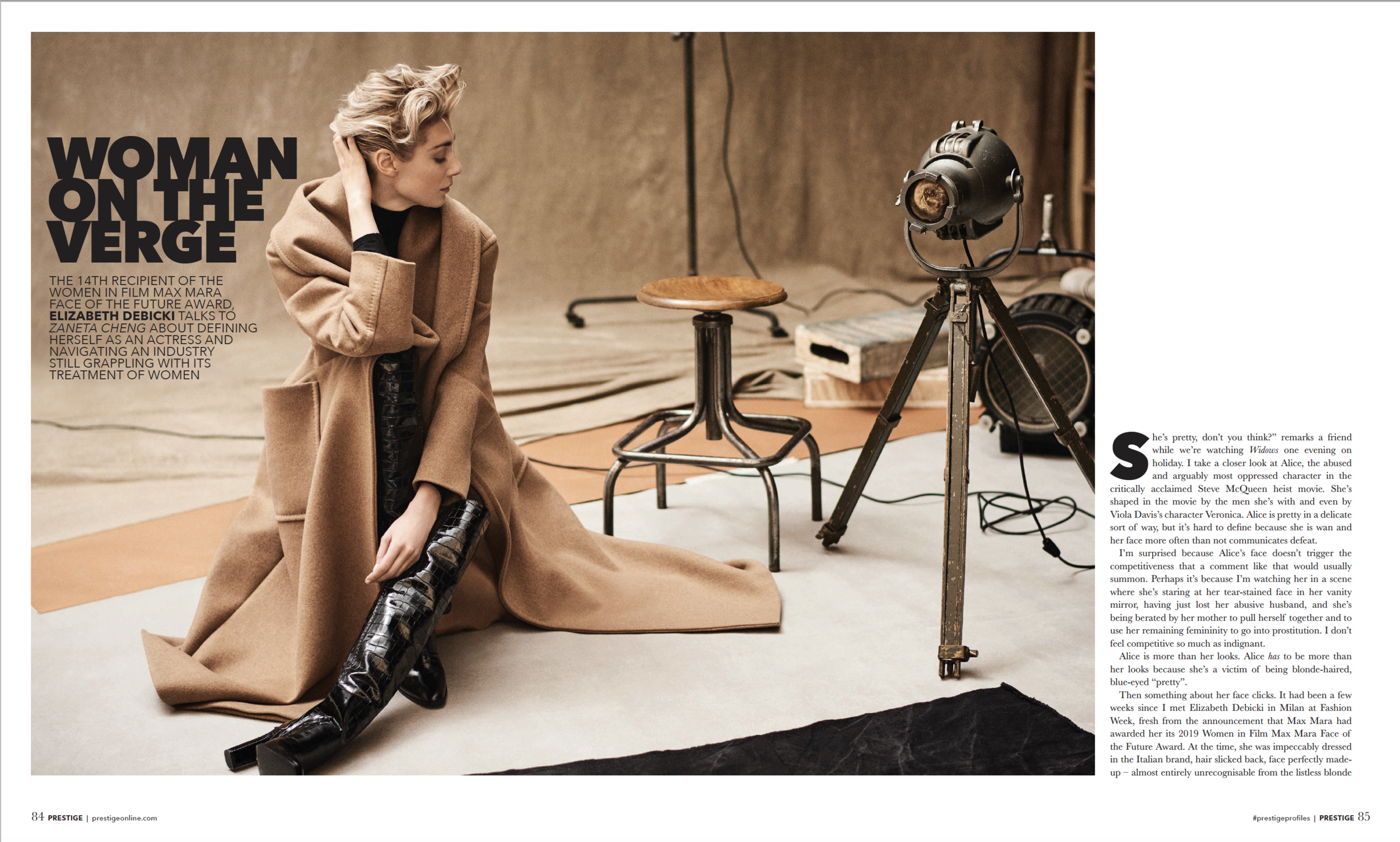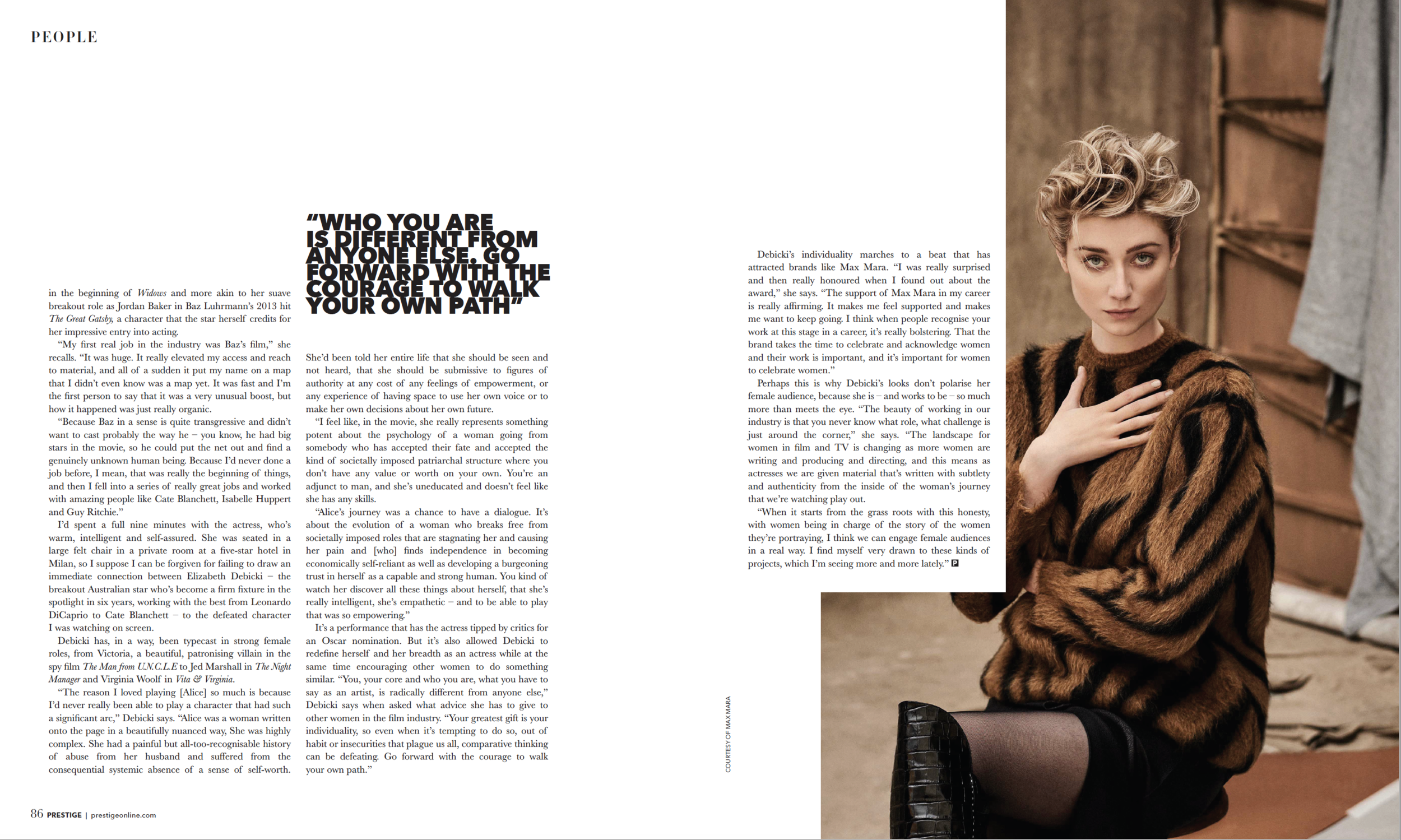Elizabeth Debicki | Prestige Hong Kong (Jun 19)
The 14th recipient of the Women in Film Max Mara Face of the Future Award, Elizabeth Debicki talks to Zaneta Cheng about defining herself as an actress and navigating an industry still grappling with its treatment of women
She’s pretty, don’t you think?” remarks a friend while we’re watching Widows one evening on holiday. I take a closer look at Alice, the abused and arguably most oppressed character in the critically acclaimed Steve McQueen heist movie. She’s shaped in the movie by the men she’s with and even by Viola Davis’s character Veronica. Alice is pretty in a delicate sort of way, but it’s hard to define because she is wan and her face more often than not communicates defeat.
I’m surprised because Alice’s face doesn’t trigger the competitiveness that a comment like that would usually summon. Perhaps it’s because I’m watching her in a scene where she’s staring at her tear-stained face in her vanity mirror, having just lost her abusive husband, and she’s being berated by her mother to pull herself together and to use her remaining femininity to go into prostitution. I don’t feel competitive so much as indignant.
Alice is more than her looks. Alice has to be more than her looks because she’s a victim of being blonde-haired, blue-eyed “pretty”.
Then something about her face clicks. It had been a few weeks since I met Elizabeth Debicki in Milan at Fashion Week, fresh from the announcement that Max Mara had awarded her its 2019 Women in Film Max Mara Face of the Future Award. At the time, she was impeccably dressed in the Italian brand, hair slicked back, face perfectly made-up – almost entirely unrecognisable from the listless blonde in the beginning of Widows and more akin to her suave breakout role as Jordan Baker in Baz Luhrmann’s 2013 hit The Great Gatsby, a character that the star herself credits for her impressive entry into acting.
“My first real job in the industry was Baz’s film,” she recalls. “It was huge. It really elevated my access and reach to material, and all of a sudden it put my name on a map that I didn’t even know was a map yet. It was fast and I’m the first person to say that it was a very unusual boost, but how it happened was just really organic.
“Because Baz in a sense is quite transgressive and didn’t want to cast probably the way he – you know, he had big stars in the movie, so he could put the net out and find a genuinely unknown human being. Because I’d never done a job before, I mean, that was really the beginning of things, and then I fell into a series of really great jobs and worked with amazing people like Cate Blanchett, Isabelle Huppert and Guy Ritchie.”
I’d spent a full nine minutes with the actress, who’s warm, intelligent and self-assured. She was seated in a large felt chair in a private room at a five-star hotel in Milan, so I suppose I can be forgiven for failing to draw an immediate connection between Elizabeth Debicki – the breakout Australian star who’s become a firm fixture in the spotlight in six years, working with the best from Leonardo DiCaprio to Cate Blanchett – to the defeated character I was watching on screen.
Debicki has, in a way, been typecast in strong female roles, from Victoria, a beautiful, patronising villain in the spy film The Man from U.N.C.L.E to Jed Marshall in The Night Manager and Virginia Woolf in Vita & Virginia.
“The reason I loved playing [Alice] so much is because I’d never really been able to play a character that had such a significant arc,” Debicki says. “Alice was a woman written onto the page in a beautifully nuanced way, She was highly complex. She had a painful but all-too-recognisable history of abuse from her husband and suffered from the consequential systemic absence of a sense of self-worth. She’d been told her entire life that she should be seen and not heard, that she should be submissive to figures of authority at any cost of any feelings of empowerment, or any experience of having space to use her own voice or to make her own decisions about her own future.
“I feel like, in the movie, she really represents something potent about the psychology of a woman going from somebody who has accepted their fate and accepted the kind of societally imposed patriarchal structure where you don’t have any value or worth on your own. You’re an adjunct to man, and she’s uneducated and doesn’t feel like she has any skills.
“Alice’s journey was a chance to have a dialogue. It’s about the evolution of a woman who breaks free from societally imposed roles that are stagnating her and causing her pain and [who] finds independence in becoming economically self-reliant as well as developing a burgeoning trust in herself as a capable and strong human. You kind of watch her discover all these things about herself, that she’s really intelligent, she’s empathetic – and to be able to play that was so empowering.”
It’s a performance that has the actress tipped by critics for an Oscar nomination. But it’s also allowed Debicki to redefine herself and her breadth as an actress while at the same time encouraging other women to do something similar. “You, your core and who you are, what you have to say as an artist, is radically different from anyone else,” Debicki says when asked what advice she has to give to other women in the film industry. “Your greatest gift is your individuality, so even when it’s tempting to do so, out of habit or insecurities that plague us all, comparative thinking can be defeating. Go forward with the courage to walk your own path.”
Debicki’s individuality marches to a beat that has attracted brands like Max Mara. “I was really surprised and then really honoured when I found out about the award,” she says. “The support of Max Mara in my career is really affirming. It makes me feel supported and makes me want to keep going. I think when people recognise your work at this stage in a career, it’s really bolstering. That the brand takes the time to celebrate and acknowledge women and their work is important, and it’s important for women to celebrate women.”
Perhaps this is why Debicki’s looks don’t polarise her female audience, because she is – and works to be – so much more than meets the eye. “The beauty of working in our industry is that you never know what role, what challenge is just around the corner,” she says. “The landscape for women in film and TV is changing as more women are writing and producing and directing, and this means as actresses we are given material that’s written with subtlety and authenticity from the inside of the woman’s journey that we’re watching play out.
“When it starts from the grass roots with this honesty, with women being in charge of the story of the women they’re portraying, I think we can engage female audiences in a real way. I find myself very drawn to these kinds of projects, which I’m seeing more and more lately.”

